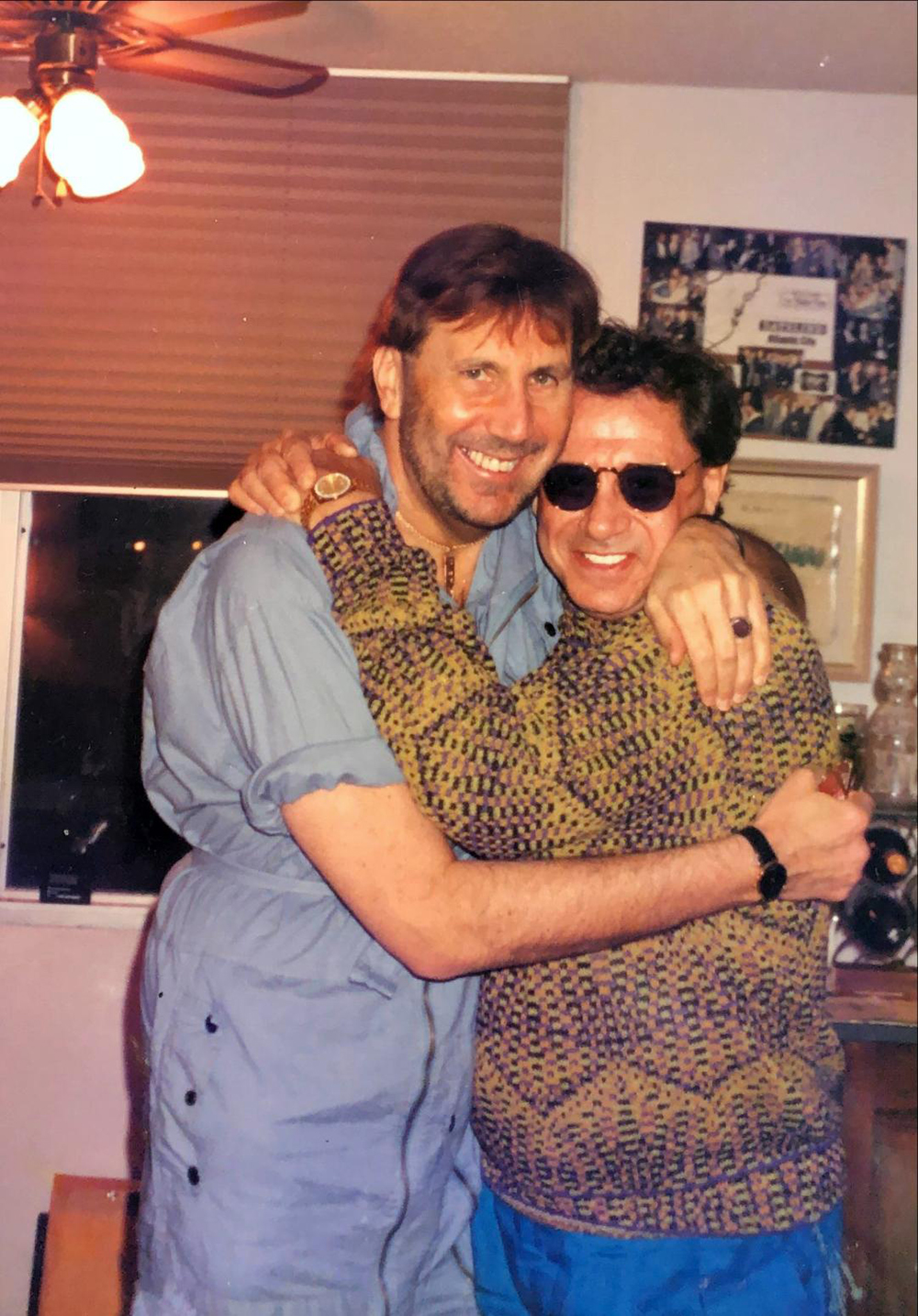There was a time when many newspaper columnists were as famous as the celebrities, politicians and sports figures they covered. When talking about those colorful figures, names like Walter Winchell, Hedda Hopper, Rona Barrett, Dorothy Kilgallen, Sheliah Graham, Louella Parsons, Liz Smith and Earl Wilson immediately come to mind.
Atlantic City’s legendary newspaper columnist and radio host, Sonny Schwartz, may have come out of the Winchell/Kilgallen school of journalists, and he was just as much a personality as they were, but his work extended way beyond political talk and coverage of visiting celebrities.
For 37 years his spot-on reporting and opinion columns for The Press of Atlantic City were not only widely read, they were extraordinarily influential.
He left The Press in 1990 and became a radio broadcaster via his nine-year affiliation with Atlantic City’s WMID Radio. His program, “Dateline: Atlantic City,” which often broadcast live from his condo at the Vassar Square Condominiums on the Ventnor Boardwalk, was sometimes entertaining, sometimes kooky, and sometimes ground-breaking.

I was a frequent guest on “Dateline” during the 1990s, promoting my books and musical appearances, and I was always astonished at Sonny’s ability to make the mundane sound exciting. He was funny, quick, and lovable – a “man about town” who left his stamp on whatever he did, whether he was writing a newspaper column, or hosting a radio or television program.
South Philadelphia native Anthony DiFlorio, III, worked as the program’s associate talent coordinator from 1993 until 1997. “He was my introduction to many of the stars who were still active and playing the casino showrooms in Atlantic City,” DiFlorio said. “I’d write promos for the guests, and later on, I made it possible for Sonny’s dream of simulcasting the radio show on cable television come true.”
The show originated out of a makeshift studio in his apartment and included a stunning mural behind the couch as a set.
“We tried to bring back the classic variety television programs, and we almost succeeded,” DiFlorio said. “I still have most of the tapes and they are a time capsule of the swan song of classic showbiz.”
DiFlorio said he will always be grateful to Sonny Schwartz for giving him his start in broadcasting.
“I think of him often when I see or hear something about entertainment and wonder what Sonny would have said about it. I doubt he would be excited about most of what passes for entertainment today.”
His daughter, Pauline Schwartz, could write volumes about her father.
“He was a larger-than-life figure who truly lit up any room with his presence,” Pauline Schwartz said. “He had a natural charisma, a sparkling wit, and a fundamental sense of humility – a rare quality for a person in the entertainment world.”
She said her father was unlike other media personalities who used their connections to brag and promote themselves.
“He always downplayed his own talent and skills and focused on others. Sonny was a true ‘mensch’ in every sense of the word. He was a champion of the underdog. He was happy to help publicize good and worthy causes in the community,” she said.
Pauline Schwartz called him a master connector and networker who never networked for his own personal gain.
“Instead he delighted in connecting people to each other. He connected aspiring, unknown entertainers to the talent agents or casino folks who could get them gigs. He connected many businesspeople and investors in the early days of the casino industry, always behind the scenes, without any promotion or benefit for himself.”
He was one of the people responsible for getting casino gambling legalized in Atlantic City in 1976, writing columns in The Press advocating for casinos, and connecting representatives from various public interest groups, pro and con, so they could try to find common ground.

“Sonny was an eternal optimist about Atlantic City, his beloved hometown. Many referred to him as ‘the city’s biggest cheerleader.’ In the dark days pre-casinos, and even after casinos brought some problems to the area, he never gave up hope.”
No homage to Sonny Schwartz is complete without telling the unlikely story of Schwartz and Frank Sinatra’s $10,000 yarmulke.
In December of 2018, Sotheby’s auctioned off items once owned by Sinatra and his widow, Barbara. According to writer Stephen Silver of The Jewish Standard newspaper, “The item that made the most headlines was one of the smallest: a hand-knit yarmulke. Frank had owned it, and someone – we don’t know who – bought it for nearly $10,000.”
As the story goes, in 1980, Sonny Schwartz was honored by the Hebrew Academy of Atlantic County at a dinner held at the old Teplitzky’s Hotel.
“It was a super-big deal for our family,” recalled Pauline. She remembers saying the Hamotzi blessing at that dinner, along with the evening’s emcee, the Jewish comedian and Rat Pack fixture, Joey Bishop.
Sonny Schwartz was a main organizer of the dinner the next year, and the following year, he produced the gala dinner, which honored Paul “Skinny” D’Amato of 500 Club nightclub fame, one of the few non-Jews to receive the honor.
Frank Sinatra was there, and during the evening, Sonny Schwartz presented Sinatra with a handmade yarmulke emblazoned with his name and musical notes.
“When I saw the picture, the one that was auctioned,” said Pauline, “I immediately knew that it was from that time, because my father got one at the same time.” (Schwartz’s yarmulke featured typewriters instead of musical notes).
As to the origins of the yarmulke: Rabbi Mordechai Weiss, then president of the Hebrew Academy, believes that presenting it was the idea of the late Rubin Wishkin, a past president of the day school, and that it was actually crocheted either by Wishkin’s wife, Miriam, or a Wishkin friend. Pauline Schwartz thinks it was one of Weiss’ daughters, or possibly Weiss’ wife.
Schwartz was involved in several charities. He was the founder of the local chapter of The 200 Club, an organization that provides immediate financial assistance to the families of fallen law enforcement and first responders who die in the line of duty. The club also gives scholarships to college-bound students who are the children of first responders/police/firefighters. There is an annual scholarship awarded in Sonny’s name, in tribute to his work in helping to found the Atlantic/Cape May County Chapter of The 200 Club.
Not long after Sonny Schwartz’s passing on Nov. 9, 1998, at age 65, his print reporting, as well as articles about him, with an assist by Sonny’s son, David, were deemed important enough to be housed in the Special Collections and Archives section within the University Library Section of the University of Las Vegas.
It’s no surprise that two Atlantic City legends, Sonny and Paul “Skinny” D’Amato, were extremely close and had a deep connection. Pauline Schwartz remembers: “I recall many times finding him on the phone with my ‘Uncle Skinny’ when I woke up in the middle of the night as a child. They would talk on the phone for hours every night, about anything and everything.
“They met in the 1950s, when my father was visiting his mother in the hospital, and Skinny was visiting his wife who was there. Skinny was like a father figure to him, but also a brother, and a best friend. He used to tell me, ‘Skinny’ taught me how to be a man’.”
Sonny Schwartz. What a man he was.
Bruce Klauber is the author of four books, an award-winning music journalist, concert and record producer and publicist, producer of the Warner Brothers and Hudson Music “Jazz Legends” film series, and performs both as a drummer and vocalist.











